- UK Brexit Secretary reiterates UK will not be seeking Brexit transition extension
- Euro (EUR) surged after EC announced €750 billion rescue fund
- German inflation -0.1% mom in May and +0.6% yoy.
- At 06:15 UTC, GBP/EUR is trading flat at €1.1134 >> Real time exchange rate
The Pound Euro exchange rate is holding steady in early trade on Thursday, consolidating losses from the previous session. The pair settle on Wednesday -0.87% at €1.1133, snapping a four-session winning streak and slightly up from the weekly low of €1.1119 reached earlier in the session.
At 06:15 GBP/EUR is trading +0.01% at €1.1134 as investors continue digesting the European Commission rescue package whilst looking ahead to a busy Eurozone economic calendar.
The Pound sunk lower in the previous session, and is consolidating those losses today, after Brexit Secretary David Frost announced that the Government will not be seeking an extension to the transition period which is due to end on 31st December this year.
There had been growing calls to extend the cut-off date after the already very tight timeline for talks was delayed owing to the coronavirus crisis.
According to reports, Prime Minister Boris Johnson will head over to Brussels next month for his first talks with European leaders for 4 months.
David Frost also turned down hopes on a EU -UK deal on UK fisheries being agreed in July. This had been a sticking point in the talks, although optimism surfaced earlier in the week that the EU was ready to soften its stance, news that had boosted sterling.
Domestic politics continue to add pressure to the Pound as Boris Johnson faces growing criticism over his to aide’s travel in lockdown. Boris Johnson will be questioned in the bi-annual quizzing of the Prime Minister by the House of Commons Liaison Committee.
The Euro gained altitude across the board on Wednesday after the European Commission’s Ursula von der Leyen announced a €750 billion crisis fund to tackle the unprecedented coronavirus crisis. The package will be made up of grants and loans for every EU member state. It combines the French – German proposal with the proposal of the “Frugal four” Austria, Denmark, Sweden and Netherlands.
There is a slew of data for investors to digest on the Eurozone economic calendar, including Eurozone consumer confidence and German inflation. Analysts are expecting German inflation to drop -0.1% month on month in May, down from +0.4% in April. On an annual basis inflation is expected at just 0.6%, down from 0.9%





